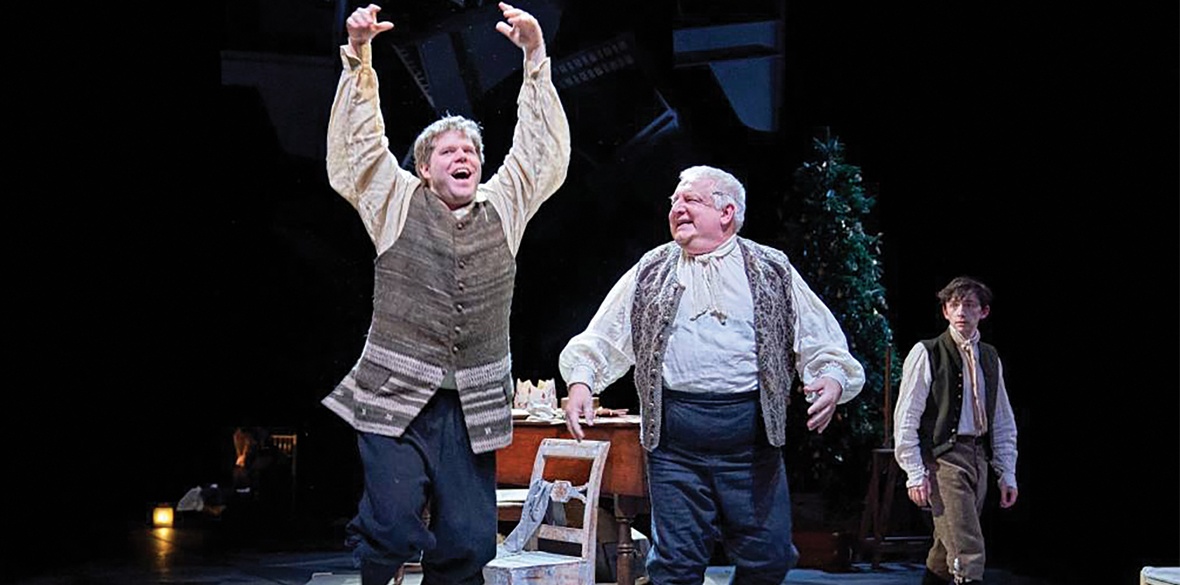This is the last article you can read this month
You can read more article this month
You can read more articles this month
Sorry your limit is up for this month
Reset on:
Please help support the Morning Star by subscribing here
THE AUDITORIUM — seating spaced for Covidian safety — is like a dimly lit cave and above the stage hangs a flock of upside-down harpsichords which look like exotic bats or prehistoric birds.
Enter Johann Sebastian Bach (Simon Russell Beale), who sits at the single harpsichord centre stage and plays the lovely Sheep May Safely Graze. This fusion of Vicki Mortimer’s set, actor and music is a fine opening to a fine play.
Soon the music changes key, a mistake is made, the famous tune repeated. The subtle comedy of this is well executed and there’s an effortless shift from Great Composer to domestic man as his wife Maria (Pandora Colin) comes on and tells him he’s keeping the baby awake: “Come to bed darling,” she implores.
He can’t. He has music to compose and a soul to put to rest, never mind the baby. She goes on to engage him in intelligent conversation about counterpoint, harmony and musical range — a masterly contrast of creative and domestic life by the accomplished duo of playwright Nina Raine and director Nicholas Hytner.
It’s evident that Bach adores Maria, yet I felt she was idealised, much as singer and wife number two Anna Magdalena (Rachael Ofori) was. Didn’t they ever yell at him? Or throw something?
Throughout the marriages, beautiful music is produced and many children — more of them dead than alive — and much of the dialogue is given to the magical thinking of the grieving women, which counterpoints Bach’s cerebral approach. His grief is bound up in the music, particularly the St John Passion.
There is a fine scene where Anna taps out a staccato of loss on the side of his harpsichord, lamenting that she is either pregnant or burying a child. It’s almost as if ever-present fever is another character in the action and it’s as if the harpsichord morphs into a coffin.
Integral to the play is Bach’s relationships with his two older sons Carl (Samuel Blenkin, terrific), and the volatile and later alcoholic Wilhelm, beautifully portrayed by Douggie McMeekin. Instead of bringing them up, Bach brought them down, despite the buffer zone of a loving mother preventing total emotional collapse and the support of her sister, the stoic and quietly suffering Katherina (Ruth Lass).
Wilhelm is the better composer in dad’s eyes, yet the omnipotent gaze of his father weakens him. Carl tries to catch up, earning his living as a jobbing composer at the court of Frederick the Great (a menacing camp turn from Pravessh Rana).
I would have liked a little more Bach story on Johann’s orphanhood at the age of nine and how making patterns in his head and great music held him together, along with more on the music of the universe, its spheres and orbs, as expressions of love and parenting. At one point love is equated with counterpoint in music, and the fugue on relationships with others. Interesting.
Some of the verbal anachronisms such as a “multi-talentless musician” or “go for it” irritate and references to failed funding applications and dialogue about anxiety states come across as if they belonged in a modern arts admin office or consulting room rather than the 18th century.
Yet the old Bach’s eviscerating attack on Carl for music containing endless expressions about his own feelings could also address todays preoccupations with the self rather than the universal in art.
Simon Russell Beale is fantastic in creating Bach in all his “pomp” — sweary, boozy, messy and human — and Jon Clark’s lighting design is lovely, lit throughout like a period painting.
And the music, of course, is just glorious music.
Runs September 11, box office: bridgetheatre.co.uk
JAN WOOLF











